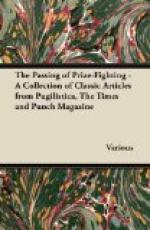* * * * *
“MORE LITERARY HEREDITY.
Fresh literary fame seems
to be pending for the Maurice Hewlett
family circle.
Mr. Robin Richards, the son-in-law
of the famous novelist, is
about to appeal to fiction
readers with his first novel.”—Daily
Paper.
No more of the old-fashioned DARWIN and GALTON nonsense about fathers and children.
* * * * *
SEVEN WHITEBAIT.
Here and there in the drab routine of modern existence it is still possible to catch an occasional glimpse of romance and courageous living, and in the volume which lies before us as we write we are given a generous measure of peril and adventure in faery seas forlorn. From Whitebait to Kipper: The Story of Seven Lives, is the vivid record of a family of herrings, set down (posthumously, it would seem) with refreshing simplicity by Walter Herring, the youngest and perhaps the most brilliant of the family. The story begins with the early childhood of Walter, John, Isabel, Margaret, Rupert, Stephanie and little Foch, the last of whom was so named because he was born on the anniversary of the Armistice. (As a matter of fact they were all born on the same day, but for some reason which is not explained only one of them was called Foch.)
You, reader, are one of those ignorant people who do so much discredit to our Public Schools. You fondly think that the whitebait is a special kind of fish, that there are father whitebaits and mother whitebaits and baby whitebaits. You are wrong. There are only baby whitebaits. At least there are baby herrings and baby pilchards, and these are called whitebait because they are eaten by the mackerel and because they look white when they are swimming upside down.
Anyhow Walter and John and Isabel and Margaret and Rupert and Stephanie and little Foch began life as whitebait. They used to charge about the Cornish seas with whole platefuls of other whitebait, millions of them, and wherever they went they were pursued by thousands of mackerel, who wanted to eat them. One day John felt that the moment was very near when he would be eaten by a mackerel, and he was quite right. Isabel felt the same thing, but she was wrong. She jumped out of the water and was eaten by a sea-gull. When the fishermen saw Isabel leaping into the air they came out and caught the mackerel in a net. They also caught Margaret with a lot of other whitebait; and she was eaten by a barrister at “Claridge’s.”
There were now four of the family who had not been eaten by anyone. It is extraordinary when you come to think of it that any herring ever contrives to reach maturity at all. What with the mackerel and the seagulls and the barristers, everybody seems to be against it. However, Walter, Rupert and Foch succeeded. Stephanie just missed. Walter and Rupert and Foch had jolly soft roes, a fact which is recorded in a cynical little poem by the precocious Foch, believed to be the only literary work of a whitebait now extant. We have only space here to quote the opening couplet:—




